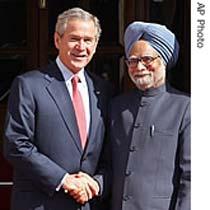2006年VOA标准英语-House-Senate Conferees Work on Bill for US-Indi(在线收听)
By Dan Robinson
Capitol Hill
06 December 2006
House and Senate lawmakers are working to clear the way for final congressional approval of legislation required to implement the U.S. - India Civil Nuclear Cooperation deal. VOA's Dan Robinson reports from Capitol Hill, the legislation has been the subject of strong disagreements between members of Congress and the Bush administration, and there has been a new expression of concern by India's Prime Minister.
The agreement, which would end a three-decade-long ban on nuclear technology exchanges, is a major priority for President Bush.
He wants the 109th Congress now nearing an end to work out remaining differences on enabling legislation and send him a bill to sign.
The administration sent Undersecretary of State for Political Affairs, Nicholas Burns, to India in attempt to calm some concerns of India, which has watched uncomfortably as lawmakers and the White House haggled over language in the legislation.
Opening a House-Senate conference late Tuesday, (Republican) Congressman Henry Hyde said the bill, which changes U.S. law to permit implementation, is the cornerstone of a new strategic partnership that should contribute to stability in South Asia.
He also mentioned a provision opposed by the Bush administration.
"This legislation will also contribute to our shared goal of strengthening the global nonproliferation regime, especially by enhancing cooperation to prevent Iran from acquiring a capacity to produce nuclear weapons," said Henry Hyde. "
The contentious provision would require India to fully and actively participate in U.S. and international efforts to dissuade, sanction and contain Iran for its nuclear program.
The State Department said New Delhi would view this as an additional condition, and cited Indian cooperation with U.S. votes against Iran in the International Atomic Energy Agency.
The administration also pressed to soften or remove language in the Senate bill relating to the transfer of enrichment, reprocessing or heavy water technologies, which are not part of the deal but are mentioned.
Congressman Tom Lantos, who will head the House International Relations Committee in the next Congress, believes the legislation and the accord as a whole will not harm U.S. nonproliferation goals.
"The conference report on this legislation will advance our common interests with India, while at the same time protecting and advancing our global nonproliferation obligations and objectives," said Tom Lantos.
Critics of the U.S.-India deal and legislation nearing final consideration continued to lash out.
Calling the U.S. - India deal a nuclear gift, Congressman Ed Markey urged conferees to ensure that India is, in his words, not able to simultaneously reap the benefits of nuclear cooperation with the U.S. and others, while continuing to support Iran's efforts to maintain a renegade nuclear program.
 |
| India's Prime Minister Manmohan Singh (r) with President Bush (file photo) |
Prime Minister Singh spoke by telephone with Frist, who said he assured the Indian leader of congressional approval by the end of this week.
Frist says he assured Prime Minister Singh that he would work personally in the House-Senate conference on the issues of concern to India.